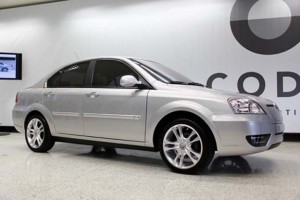
Coda is the latest battery carmaker to team up with a rental car outlet in hopes of reaching potential buyers.
By mid-decade, according to some industry estimates, as many as three dozen battery cars could be available to American consumers. But recent studies suggest that U.S. motorists remain reluctant to plug into the new technology, citing concerns like price and range anxiety.
So, to give potential customers a safe way to try out their battery offerings, several makers are teaming up with daily rental fleets, where a day’s drive might overcome such concerns. The latest to announce a rental car program is the start-up battery car maker, Coda, which has to deal with the additional challenge of minimal name recognition.
Starting next year, the maker says, it will offer some of its new battery sedans at Hertz rental car locations in Southern California, the region many expect to become the largest near-term market for battery-electric vehicles, or BEVs.
“With one of the world’s largest rental car fleets, Hertz is uniquely positioned to catalyze the adoption of all-electric vehicles and infrastructure supporting electric mobility, said Mark Jamieson, CFO & COO, CODA Automotive.
Due for launch next year, the 4-door, 5-passenger Coda Sedan will use a 33.8 kilowatt-hour lithium-ion battery to deliver an average range of about 90 to 120 miles. Coda claims it will require just a 6-hour recharge and that the sedan will be able to deliver 40 miles of range – after drawing down to 0 – after a 2 hour quick charge.
Coda has reason to want to find a partner to promote its products. According to the recent Drive Green study, by J.D. Power and Associates, battery cars will only account for about 7.3% of the global automotive market by 2020.
Yet there are other indications that the technology could actually catch on faster – at least if consumers become more comfortable and aware of its advantages, observers say. Proponents cite a separate survey, by Consumer Reports, that found nearly a third of U.S. motorists would consider some form of battery propulsion, from basic hybrids to full BEVs, for their next vehicle.
While automakers have often used rental fleets as a dumping ground for excess production, analysts say a more selective use of these outlets can prove effective for giving customers a first look at a new vehicle or new technology.
And Coda isn’t the only maker looking at this opportunity. Both Chevrolet, with its new Volt plug-in, and Nissan with its Leaf battery car, plan to place some of their product into rental fleets.
“Hertz is committed to the widespread use of electric vehicles globally and we are laying the foundation to make electric vehicle mobility a reality today,” said Mark P. Frissora, Chairman and Chief Executive Officer, The Hertz Corporation, which operates 8,300 rental sites.
The world’s largest rent-a-car company plans to begin a full-scale battery car program, both in the U.S. and abroad, in 2011.
